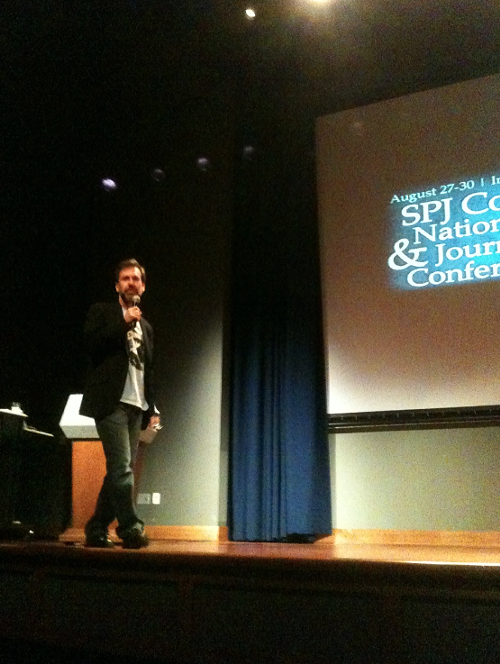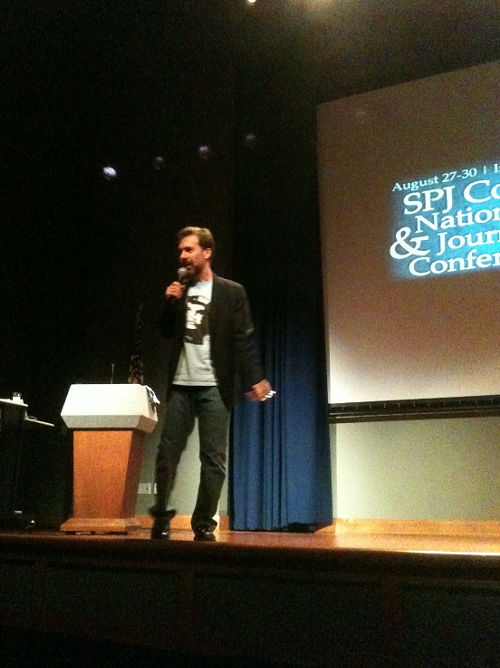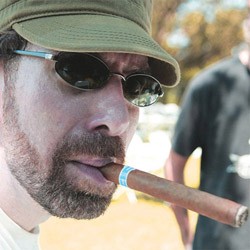
Yesterday evening, I attended the University of Memphis’ 31st Annual Freedom of Information Congress that featured controversial journalist Michael Koretzky.
Titled “An Evening with Michael Koretzky,” the event was presented by the U of M’s student chapter of the Society of Professional Journalists (Koretzky is a board member of the national chapter).
Currently a freelance writer as well as an editor for several city magazines in South Florida, Koretzky shared his thoughts on the future of journalism and journalism education, discussed his style of reporting, opened up about being expelled from the University of Florida and getting fired from the Sun Sentinel and Florida Atlantic University’s award-winning student newspaper, The University Press during the lecture.
Prior to the event, I wasn’t too familiar with Koretzky, so I didn’t know what to expect besides the possibility of him presenting some disputable information. But he turned out to be quite entertaining and informative, especially when he disclosed some of the biggest problems he has with journalism. Among the issues with the profession, he highlighted the necessity for journalists to have thicker skin and to be a little braver or just as brave as the sources they interview.
“I’m sure that any student reporter in this room has faced a situation where you’re interviewing somebody, and they’re reluctant to talk to you on record, and you’re trying to convince them that it’s okay. That everything will be fine, but we don’t do that ourselves,” Koretzky said to attendees in the U of M’s University Center Theater.
“I think sometimes we spend too much time taking students with good grades who don’t have the personality to do this job,” he said. “This is not accounting. This is not computer programming. You have to be able to speak to people. You have to be able to stand up for yourself. You have to be able to inspire your sources.”
Koretzky also touched on the lack of respect that journalists receive from citizens. He attributed this to many of us being “hypocrites.”

“You know how they do those surveys every year on the most admired professions,” he said. “It’s always like firefighters, Supreme Court justice, doctors, and then right down at the bottom, between used car salesman and a pimp, is the journalist. Journalists get no respect. We always say that journalists get no respect because we’re doing tough work or speaking truth to power. I don’t think that’s it. I think people hate journalists because in this country, we only hate one thing and that’s hypocrites.”
I pondered his comments. Who loves hypocrites? I can attest that not too many people do, but we all can be hypocritical at times. Stating that, I didn’t understand why Koretzky would single out journalists as hypocrites. I’m not saying we’re superior, but I believe there are hypocrites in every profession. I don’t think one profession boasts a larger amount of hypocrites than another. As I mentioned earlier in this post, I expected that Koretzky would make some statements that were debatable, and this indeed was one of them.
Koretzky also touched on the frustrations of censorship within publications, and revealed that he was an associate editor at the world’s largest jazz magazine, Jazziz, but didn’t know anything about jazz. He even compared jazz to journalism.
“Jazz got its start in the whorehouses of New Orleans. Only later, these days now that you can go and get a degree in jazz from Berkley, University of Miami,” he said. “Now jazz is really richy. And if you don’t have a degree in jazz, you’re not considered a serious recording artist. Well, I think journalism is the same way. Before there were journalism schools, there was journalism. Now that there are journalism schools, I think it helps, but I also think it can hurt.”
Koretzky’s popular blog, Journoterrorist, which he admitted to receiving a lot of negative feedback on due to some of the content he posts, was also something he opened up about to the audience.
“I call it ‘journoterrorist’ as a joke. It’s a media critique website,” he said. “I’ve only posted 31 times in years but for some reason, I have 198,000 viewers and over 500 comments. What’s really weird about that is the comments are mostly from journalism students and professors and professionals who don’t like what I wrote. And I don’t think I wrote anything incredibly evil. I just wrote my opinion of journalism in the same way that I was trained to be a journalist and cover other people.”
After completing his hour-long presentation, Koretzky took questions from the audience. With the recent increase of newspapers and magazines folding over the last few years, and me being a reporter for a print publication, I asked him his thoughts on the status of print publications in the next five to 10 years. He told me that he went from working at a national website to joining a print publication, alluding that there’s still hope for print.

“What I find is that print is alive and well when it’s niche,” Koretzky said. “The mainstream print media may not have much of a future, but there are things that you can do with print that you still can’t do online. So high quality print still works. Like magazines and smaller niche publications are doing great. Advertising is up, partly because it’s different and advertisers want something different. We still read magazines.”
Overall, Koretzky kept me entertained and my mind racing about the various topics he discussed. He caused me to truly think about journalism as a profession, what the true purpose of a journalist is, and where we stand in the future. Stating that, I’m not worried that there won’t be a market for my profession, but I’m not getting too comfortable with just being a reporter. In a career like this, it’s evident that you have to bring something new to the table if you desire to go a long way, because the same ole, same ole doesn’t get you far. I’m thankful that I attended the SPJ’s event yesterday, because I definitely left feeling more enlightened on my profession.
Brief Info on Koretzky:
He has worked at several publications including Florida’s Sun-Sentinel and freelanced for The New York Times, USA Today, and Travel & Leisure. He’s also owned several publications that include Ice Magazine and Free Press.
He also was the managing editor of the world’s largest jazz magazine, Jazziz, and the adviser for FAU’s student-run newspaper, the University Press. He was accused of ethical violations in 2004 by FAU’s Student Government and almost fired and fined $6,000. He was let go from the publication in 2010 due to reorganization of FAU’s student media. He’s currently a volunteer adviser for the University Press.
Visit Koretzky’s Journoterrorist blog
Follow Koretzky on Twitter: @Koretzky
Follow me on Twitter: @Lou4President
Friend me on Facebook: Louis Goggans